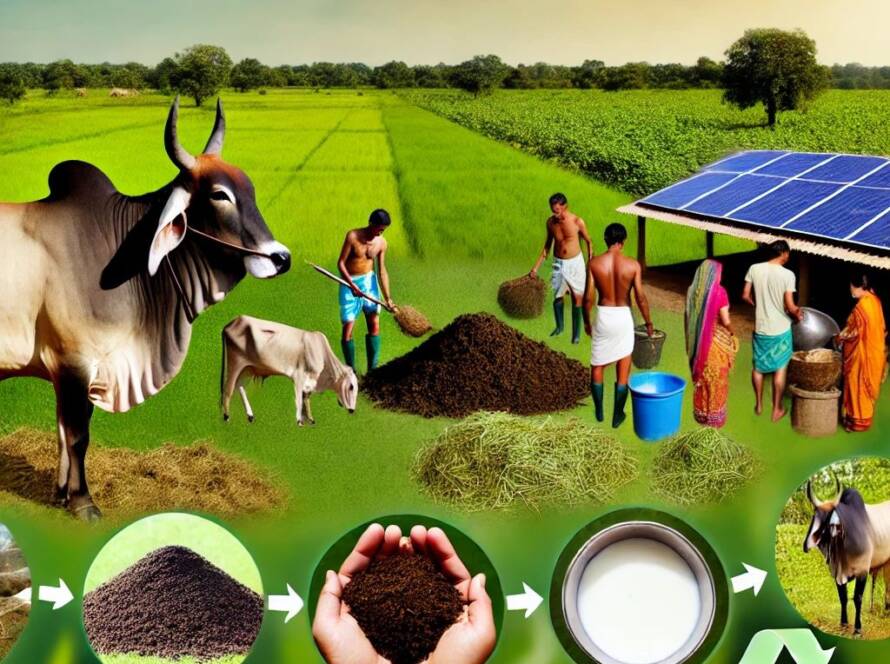India has long revered the cow, symbolizing purity, non-violence, and abundance in Hindu culture. The concept of Gau Mata (Mother Cow) reflects the deep spiritual and cultural significance of cows in Indian society, where they are seen as a source of sustenance, wealth, and environmental balance. In recent years, India’s cow welfare efforts have transcended cultural boundaries, gaining global attention for their environmental and ethical implications. The country’s holistic approach to cow welfare, encompassing both the physical well-being of cows and sustainable agricultural practices, is inspiring the world to rethink how we treat animals and the environment.
The Cultural and Ethical Significance of Cows in India
In India, cows are revered not only as sacred animals but also as essential contributors to the agricultural economy. Their milk, dung, and urine are integral to rural life, used in everything from nutrition to farming. The reverence for cows is rooted in religious beliefs that regard them as symbols of fertility, nourishment, and the gentle aspects of nature. This cultural attitude has resulted in policies and practices that protect cows and promote their welfare, even in the face of modern industrial farming practices.
While India’s approach to cow welfare is deeply rooted in spirituality and ethics, it has also evolved into a more organized and formal movement in recent years. Various government initiatives, non-governmental organizations (NGOs), and grassroots efforts aim to provide cows with a life of dignity and care, particularly in rural areas. These efforts not only focus on the physical needs of the cows but also address the broader ecological impact of livestock farming, emphasizing the importance of sustainability and ethical practices.
Gau Mata: A Symbol of Sustainable Farming
One of the most striking aspects of India’s cow welfare efforts is the integration of cow-based organic farming systems. Cows are used in many rural parts of India as part of sustainable agricultural practices, where their manure and urine are utilized for organic farming. Cow dung, for instance, is used as a natural fertilizer, enhancing soil health and reducing reliance on chemical fertilizers. Cow urine is also believed to have medicinal and agricultural properties, making it a key ingredient in natural pesticides and fertilizers.
This approach contrasts sharply with industrial farming methods, where cows are often raised in confinement and subjected to harsh conditions, resulting in environmental degradation and poor animal welfare. In India, cow-based farming, which follows traditional and organic practices, helps conserve biodiversity, maintain soil fertility, and reduce the use of harmful chemicals. The focus on sustainability has global relevance as more nations look for alternatives to industrial farming, seeking ways to reduce carbon footprints and preserve natural resources.
Cow Welfare and the Environment: A Global Lesson
India’s cow welfare initiatives also offer valuable lessons in environmental sustainability. The connection between animal welfare and environmental health is increasingly being recognized worldwide, and India’s efforts provide an example of how traditional farming practices can align with modern ecological principles.
For example, sustainable grazing systems that prioritize cow welfare have been shown to improve soil health and promote carbon sequestration. Healthy pastures where cows graze responsibly help store carbon in the soil, reducing the amount of CO2 released into the atmosphere. Additionally, the practice of using cow dung for biogas production is helping rural communities access renewable energy, providing a cleaner and more sustainable energy source while reducing reliance on fossil fuels.
By promoting ethical and sustainable farming practices, India is showing the world that cow welfare can have a direct, positive impact on the environment. As global concern about climate change intensifies, countries are increasingly turning to sustainable agricultural practices, and India’s model is gaining attention as a potential solution.
The Role of Cow Protection Laws and Advocacy
India has implemented several laws and policies aimed at protecting cows, reflecting the country’s commitment to their welfare. These laws, which vary across states, often focus on banning the slaughter of cows, promoting the humane treatment of cattle, and providing incentives for farmers who adopt cow-based organic farming methods. In addition, various advocacy groups and NGOs are working to raise awareness about the importance of cow protection and welfare, advocating for policies that promote ethical treatment and sustainable practices.
While cow protection laws are controversial in some parts of the world, especially when it comes to balancing cultural practices with economic needs, India’s emphasis on cow welfare highlights the broader ethical issues surrounding animal agriculture. The debate around cow welfare in India offers an opportunity to discuss how societies can balance tradition, culture, and modern agricultural needs in a way that benefits both animals and the environment.
Global Recognition and Future Potential
India’s commitment to cow welfare is not only influencing its own citizens but is also gaining international attention. Global organizations and environmental groups are recognizing the country’s efforts as a model for integrating animal welfare with sustainable farming. From organic farming practices to renewable energy solutions, India is showing the world that prioritizing cow welfare can create a more balanced and sustainable approach to agriculture.
As the world faces growing environmental challenges, India’s example offers a path forward that integrates ethical animal care with sustainable agricultural practices. By focusing on cow welfare, India is not just protecting an animal—it is nurturing the Earth. The global relevance of India’s Gau Mata initiative lies in its potential to inspire a shift toward more conscious and sustainable farming practices worldwide.
Conclusion
India’s cow welfare efforts are a shining example of how culture, ethics, and environmental sustainability can converge to create a more harmonious world. Through cow-based organic farming, the protection of cows, and a focus on sustainability, India is offering valuable lessons that resonate far beyond its borders. The world is taking notice, and as the movement gains momentum, we can hope to see more countries adopt similar approaches to ensure a greener, more sustainable future for all.



